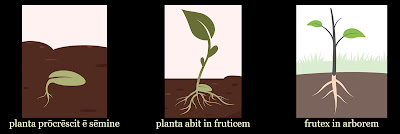Only part of the original text is used here.
A plant groweth from a seed. │planta prōcrēscit ē sēmine.
A plant waxeth to a shoot, │planta abit in fruticem,
A shoot to a tree, │frutex in arborem,
The root beareth up the tree. │rādīx sustentat arborem.
The body or stem riseth from the root. │stirps (stemma)
surgit ē rādīce.
The stem divideth itself into boughs and green branches made
of leaves. │stirps sē dīvidit in rāmōs & frondēs factās ē foliīs.
The top is in the height. │cacūmen est in summō.
The stock (trunk) is close to the roots. │ truncus adhæret
rādīcibus.
Notes and vocabulary
[1] prōcrēscō, -ere [3]: literally: grow forth
i.e. arise; spring up
[2] a plant waxeth to a shoot / grows into a shoot,
│planta abit in fruticem
abit < abeō, abīre: depart; go away, but can, as here, be
used more poetically to mean ‘be transformed; turn into’
In villōs abeunt vestēs, in crūra
lacertī. (Ovid)│ Clothes turn (in)to fur, arms to legs.
[3] stirps sē [reflexive] dīvidit │ the stem divides itself
[4] stirps sē dīvidit in rāmōs et frondēs ¦ factās ē
foliīs │ the stem divides itself into boughs and branches ¦ made
of leaves; perfect passive participle (factās)
Note: frōns, frondis [3/f] in itself means a leafy
branch
ē / ex + ablative indicating source or material:
https://adckl.blogspot.com/2025/02/210525-level-3-summary-of-of-uses-of_25.html
[5] adhaereō, -ēre [2]: stick to; cling to; be close to
truncus adhæret rādīcibus [dative] │ the trunk
is close to the roots.
The verb is a compound of ad + haereō; many
compound verbs in Latin take the dative case:
https://adckl.blogspot.com/2025/02/130425-level-3-verbs-with-dative-case-1.html
[6] vocabulary
cacūmen, cacūminis [3/n]: top; peak; summit
folium, -ī [2/n]: leaf; petal; needle of a conifer:
Ex hīs pīnus
atque pīnaster folium habent capillāmentī modo praetenue longumque et
mucrōne aculeātum. (Pliny the Elder) │ Of these, the pine and wild pine
have a leaf [that is] very thin and long, in the manner of
hair, and tipped with a sharp point.
frōns, frondis [3/f]: a leafy branch
frutex, fruticis [3/m]: although the translator gives the
meaning as ‘shoot’ i.e. the small stem of a new plant, the word refers to the trunk
or lower part of the tree, and in Classical Latin also means ‘shrub’ or ‘bush’,
but not in this text
rādīx, radīcis [3/f]: root
rāmus, -ī [2/m]: branch; bough
sēmen, sēminis [3/n]: seed
stemma, stemmatis [3/n]: stem; the noun has the original
meaning of ‘garland’ or ‘wreath’ as well as ‘lineage’, genealogical tree; the
English word stem is of Germanic origin (OE: stemn; Gmn: Stamm)
stirps, stirpis [3/f]: lower part of the plant; stem; stalk;
the noun can also refer to a person’s lineage (i.e. family roots)
truncus, -ī [2/m]: tree trunk






No comments:
Post a Comment